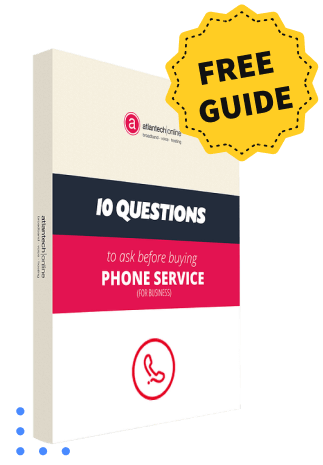TDM vs. SIP: Which is Best for Business?
October 7, 2020

Businesses that are looking to advance or scale their phone systems are facing a tough decision today.
For over 3 decades, Time-Division Multiplexing (TDM) has been the reliable standard. And while TDM has providing loads of value for businesses, the future is owned by the newer SIP (Session Initiation Protocol) technology. It allows for more innovative implementations and has numerous advantages over TDM systems.
Still, TDM is here to stay for the immediate future, until SIP implementations become so cheap that companies no longer have a logical choice but to migrate to the newer technology. This brings up a question we field often about whether companies should stay with TDM, or make the jump to SIP.
SIP vs. TDM: Which Is Best?
The truth is, deciding which one is better depends on your company. From a technological perspective, SIP is obviously better. There are just so many advantages of treating voice as data, from both a usability and technical standpoint.
The real question that must be answered is, which one is best for you?
For some companies, sticking with TDM technology may be the best choice. If budgets are low, and if telephone usage is a low priority for your company, sticking with the old technology is a cost-effective, low-maintenance way to go. However, if your phone system is imperative to company success, upgrading to SIP can make a lot of sense over the long term. Just make sure you have enough bandwidth to support adding phone service delivered via SIP to the other traffic you generate over the Internet.
One of the greatest benefits of SIP is the ability to add services like our nation-wide business wireless, Microsoft Teams Calling, and more. If you're interested in seeing what a premier telecommunications provider can do for your business phone services, contact Atlantech today.
Advantages of SIP Over TDM
TDM is a relatively old technology, relying on telco switch signaling to make phone calls work. It's a brilliant system, which is why it's been used for more than 50 years. But when it was invented, the Internet wasn't even thought of yet. Now with a hyper-connected world, the ability to transmit data so quickly has introduced exciting alternatives to traditional phone systems.
SIP Costs Less Than TDM
TDM relies on phone lines and technical equipment to make phone calls happen. SIP calls are transferred over a single IP path (or multiple paths if you've engineered some redundancy into your network design!), along with data and video signals. Because everything becomes data, the cost of infrastructure goes way down as you can leverage the same wiring and network equipment for both voice and data traffic.
The physical hardware required for SIP is also much less than with TDM as you're using Ethernet rather than specialized Telco interfaces. Gone are the days when you'd need to purchase HSSI cards for a DS-3 that could cost thousands of dollars. SIP doesn't require a specialized, telco gateway nor the installation of phone circuits from the ILEC. Instead, all you need is broadband internet connectivity.
SIP Has More Flexibility
Due to a reliance on data transfer, as opposed to physical equipment, SIP has more flexibility, both in implementation and usage. Installing and upgrading SIP trunks is something that can be done quickly and easily without the purchase of expensive new hardware. For instance, if you have 23 PRI lines and want to go to 27 lines, you'll have to order a new card for your PBX and have a second PRI installed. Circuit install can take as long as 30 - 45 days. Turning up more call appearances on an SIP trunk can be done self-serve through a web interface or simply by opening up a ticket with your carrier.
SIP Is Easier to Manage
Because SIP phone service is much like broadband Internet connections, troubleshooting problems becomes a simple process without the need to call in outside technicians to check hardware. IP hardware has a much longer lifespan than TDM, so investments made into the technology bring a higher ROI at a lower price. And, it can be leveraged across both your data and voice networks... as it's been converged into one!
SIP Extends Your Office
Because the signal is controlled like data, phone numbers no longer are determined by the location of equipment. A company headquartered in New York can have a local number for satellite offices in Los Angeles and Dublin.
Phone calls can also be rerouted easily regardless of the location of the receiver. In this way, employees across the globe can interact with phone calls like they were in connecting cubicles. Being able to connect from anywhere, even while on vacation, is another huge advantage of employing SIP technology.
SIP Is More Reliable
There are more advantages to SIP than just cost and features. SIP is more reliable than TDM for a few reasons, mainly the lifespan and operative simplicity of the equipment. But there are redundant backups to ensure your phone system doesn't face any downtime from hardware failures.
Which Is Best For Your Needs?
Addressing this question again comes down to your needs. If basic phone service is all you need, and your company doesn't have a large reliance on phone service, having a TDM system in place may be the best option. If phone service, and the innovative ways to implement it over IP, is something that can add value to your company, customer service, and business processes, you may need to make the leap to SIP.
We recommend talking to a professional to get a needs analysis completed before you decide to buy a phone system or service. This way you will know you are getting exactly the service and functionality you need to help your business thrive. You can contact the professionals at Atlantech today to start mapping out the ideal phone system for your business.


